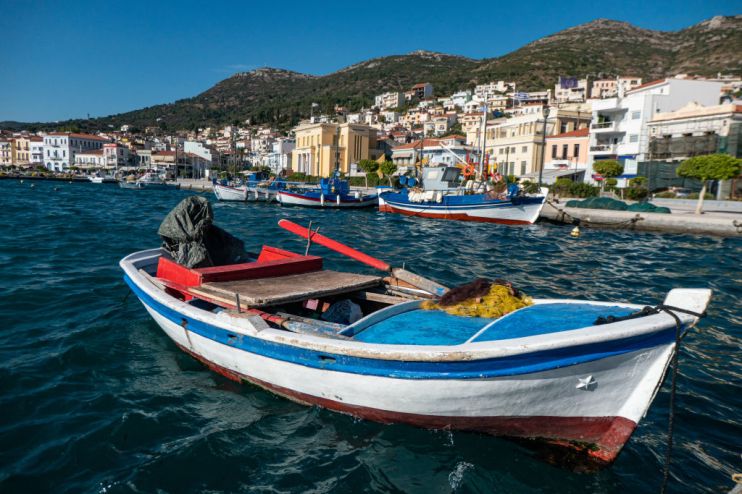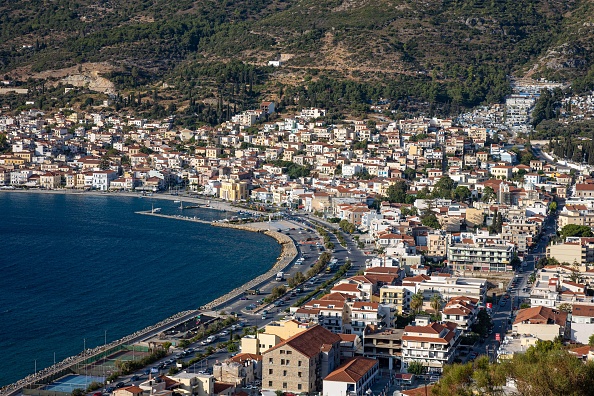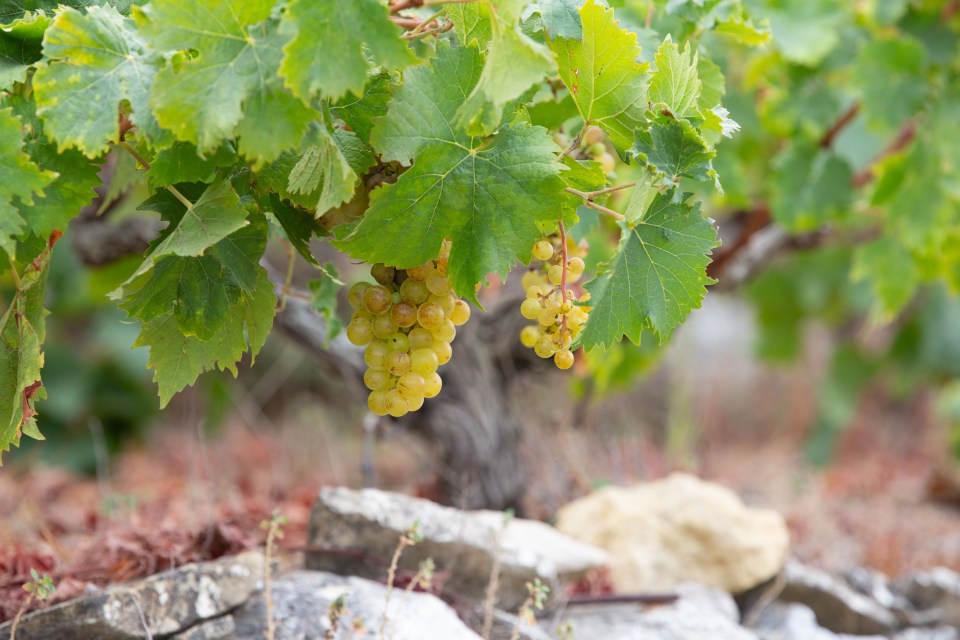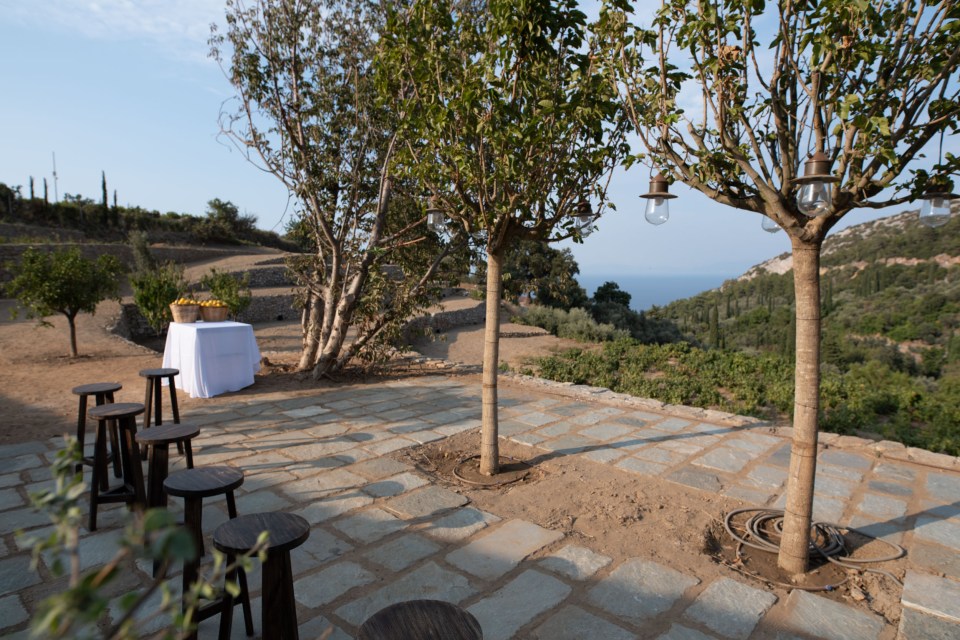Samos: Greece’s treasure in the East Aegean Sea and spiritual home of Metaxa

Stepping off the plane onto the ancient island of Samos is a treat for the senses, with arrivals greeted by the Aegean Sea to the east and the mighty Ampelos mountain to the West. While most of the postcard perfect images of this view show blue skies and an impenetrable sun, I was greeted by something resembling Cornwall’s famed “mizzle” (a mixture of mist and drizzle).
Not to be perturbed, I marched on toward my resort and indulged in some of the finest spanakopita (spinach and feta filo pie) to ever pass my lips while waiting for the poor weather to pass over. The unseasonably cool weather – Samos has an average high of 29 degrees in September – soon passed and the world quickly became my oyster.
Samos is located in the East Aegean Sea and is just one mile away from the coast of Turkey. Looking out at the horizon from the eastern side of the island will provide beautiful views of the Turkish coastline, while ferry rides to the beach town of Kusadasi take around an hour and a half. My time was too limited to undertake this particular adventure and I instead opted to hit the local beaches as the sun emerged from the clouds.
Samos has a veritable treasure trove of beaches on all parts of the island. The closest to the main town, also called Samos, is Mourtia, while those staying in the smaller village of Pythagoreio will be close to the equally pristine Paralia Glikoriza or the crown jewel of the island, Psili Ammos. Greece is famous for its warm, aqua marine water and dramatic coastlines, with Psili Ammos the embodiment of the perfect Mediterranean beach.

Spreading out beneath the blaring Greek sun on this incredible beach, while casually sipping on a Mythos beer, was one of the highlights of my stay and provided the relaxing antidote to the grey British summer of 2021. There is also the option of staying in a resort and using their beachside facilities for those who want to minimise travel. Doryssa Seaside Resort is a particular gem and boasts fantastic restaurants for all times of the day.
The island allows for experiences beyond just beaching and lounging all day, with visitors able to discover the key role Samos has played in Greece’s culture and history. The rugged terrain of Samos has acted as a wellspring of inspiration to Greeks for thousands of years. It was the home of renowned philosophers Pythagoras and Epicurus, along with astronomer Aristarchus who first proposed that the Earth revolves around the Sun.
The thoughts and ideas inspired by Samos are a part of the story of western civilisation and have helped move mankind further into the light of knowledge and sophistication. Some of this fascinating history can be discovered at the Pythagorion Archaeological Museum, which has around 3,000 artefacts discovered among the ruins of the ancient Greek towns of the island.
However, it is not just philosophy that has been pushed forward to new heights on this small Aegean island. It is also famed for its unique terroir and the delightfully sweet grapes that have for millennia produced alcoholic beverages for the locals. The island’s most famous product has long been its Muscat, a dessert wine known for its rich, fruity and floral notes. Samos Vin Doux has become a particular favourite in British households, with bottles sold at supermarkets and wine merchants across the country.

This sweet nectar also provides the key ingredient for another classic Greek export: Metaxa. The spirit was founded by silk merchant Spyros Metaxa in 1888 and has become a national treasure for a country that boasts a rich, but understated, gastronomical heritage.
The importance of the drink to the Samos locals, and Greeks more generally, was well summed up by a local taverna owner Geórgios: “Metaxa is a constant in my life and in the life of my tavern. I bought a nice bottle for each of my children from the year they were born to give to them one day.”
The three key ingredients to the many variants of Metaxa are Muscat, sourced only from grapes grown on the island; aged wine distillates; and a secret blend of botanicals. The unique terroir of Samos is essential to the product, with Muscat identified by Spyros Metaxa as a way to provide a slightly sweeter spirit than was widely available in 1888. The amber spirit stands alone in its own unique alcoholic class as the presence of Muscat and botanicals means that it cannot qualify as a brandy.
Visiting one of the several vineyards on the island is a great way to gain a deeper understanding of how Samos’ conditions help create the perfect blend. The grapes are grown on the slopes of Ampelos, which allows for a cool breeze off the Aegean to stimulate the grapes. This, combined with Samos’ fertile soil and sunny conditions, provides the aromatic and sweet flavours of Muscat wine.
A perfect way to finish a day traipsing around Samos’ vineyards is to visit Metaxa’s new home on the island: Metaxa Liknon. The new venture is part-museum, part-bar where visitors can learn about the history of Metaxa and the region or relax with a cocktail. It is also situated on the most stunning hill peak, which provides glorious views of the Aegean Sea and the surrounding hillsides.

House of Metaxa managing director Dorothee Heriard Dubreuil said the brand chose the name Liknon, which in Greek means ‘cradle’, “in order to signify that it is here in Samos that Metaxa begins”.
And so in this veritable cradle of civilisation, cradling a drink or five, one can look out at the same spectacular views once shared by ancient Greece’s great thinkers and ponder life’s mysteries. Or, alternatively, get very tipsy and speak to the locals about the fortunes of Olympiacos F.C. The choice is yours.
Need to know
- Aegean Airlines flies from Heathrow to Samos via Athens, with flights from £180
- Doryssa Seaside resort has rooms from £130 a night. Visit.doryssa.gr.
- Metaxa Liknon will be open for visits and private events from later this year. For details, keep an eye on: https://www.remy-cointreau.com/en/news